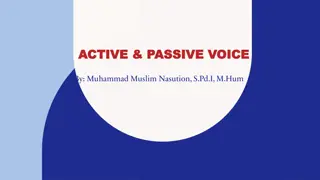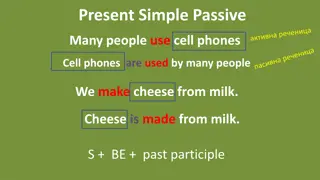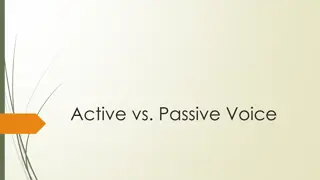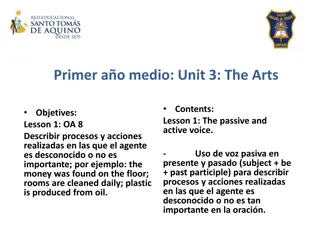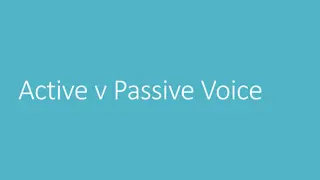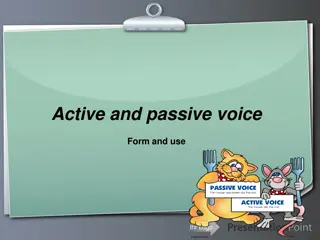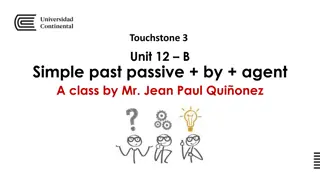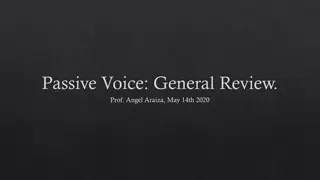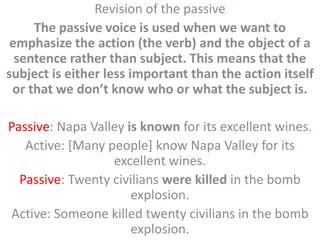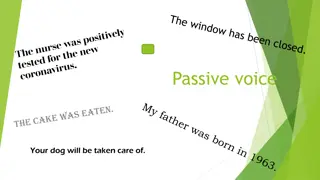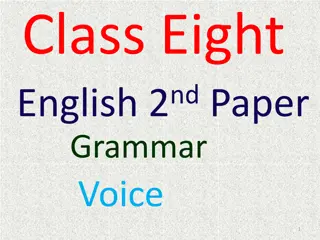Understanding Active and Passive Voice in English Grammar
Explore the concept of active and passive voice in English grammar with examples and explanations. Learn how the subject and object positions change between active and passive sentences, along with tense forms and common usage scenarios. Practice exercises included to reinforce learning.
Download Presentation

Please find below an Image/Link to download the presentation.
The content on the website is provided AS IS for your information and personal use only. It may not be sold, licensed, or shared on other websites without obtaining consent from the author. Download presentation by click this link. If you encounter any issues during the download, it is possible that the publisher has removed the file from their server.
E N D
Presentation Transcript
ACTIVE VS. PASSIVE subject verb object the boy. Active: (a) Mary helped subject verb Passive: (b) The boy was helped by Mary. In the passive, the object of an active verb becomes the subject of the passive verb: the boy in (a) becomes the subject of the passive verb in (b). Notice that the subject of an active verb follows by in a passive sentence. The noun that follows by is called the agent." In (b): Mary is the agent. Sentences (a) and (b) have the same meaning.
Passive: be + past participle (c) He is helped by her. He was helped by her. He will be helped by her. Form of the passive: be + past participle Active: (d) An accident happened. Passive: (e) (none) Only transitive verbs (verbs that can be followed by an object) are used in the passive. It is not possible to use intransitive verbs (such as happen, sleep, come, seem, die) in the passive. (See Appendix Chart A-1.)
TENSE FORMS OF THE PASSIVE Active Mary helps the boy. Passive The boy is helped by Mary. (a) simple present (b) present progressive Mary is helping the boy. The boy is being helped by Mary. (c) present perfect* (d) simple past Mary has helped the boy. The boy has been helped by Mary. Mary helped the boy. The boy was helped by Mary. (e) past progressive (f) past perfect* Mary was helping the boy. The boy was being helped by Mary. Mary had helped the boy. The boy had been helped by Mary. (9) simple future Mary will help the boy. The boy will be helped by Mary. (h) be going to Mary is going to help the boy. Mary will have helped the boy. The boy is going to be helped by Mary. The boy will have been helped by Mary. (i) future perfect*
*The progressive forms of the present perfect, past perfect, and future perfect are rarely used in the passive. ( j) Was the boy helped by Mary? (k) Has the boy been helped by Mary? In the question form of passive verbs, an auxiliary verb precedes the subject.
Exercise 4, p. 213. 2. Customers are served by waitresses and waiters. 3. The lesson is going to be explained by the teacher. 4. The farmer s wagon was being pulled by two horses. 5. Yoko will be invited to the party byToshi. 6. That report is being prepared by Alex. 7. The book had been returned to the library by Kathy. 8. Several public buildings have been designed by Miriam. 9. I won t be fooled by his tricks. 10. That note wasn t written by me. Was it written by Jim? 11. Is that course taught by Prof. Shapiro? No, it isn t taught by him. 12. Those papers haven t been signed by Mrs. Andrews yet. Have they been signed by Mr. Andrews yet? 13. Anwar gave the speech. 14. The teaching assistant is going to correct our assignments. 15. Did Thomas Edison invent the electric light bulb? 16. Most drivers don t obey the speed limit on Highway 5. 17. Has the building manager informed you of the rent increase?
USING THE PASSIVE (a) Rice is grown in India. (b) Our house was built in 1980. (c) This olive oil was imported from Crete. Usually the passive is used without a by-phrase. The passive is most frequently used when it is not known or not important to know exactly who performs an action. In (a): Rice is grown in India by people, by farmers, by someone. It is not known or important to know exactly who grows rice in India. Examples (a), (b), and (c) illustrate the most common use of the passive, i.e., without the by-phrase.
(d) My aunt made this rug. (active) If the speaker knows who performs an action, usually the active is used, as in (d). (e) This rug was made by my aunt. That rug was made by my mother. (f) Life on the Mississippi was written by Mark Twain. Sometimes, even when the speaker knows who performs an action, he/she chooses to use the passive with the by-phrase in order to focus attention on the subject of a sentence. In (e): The focus of attention is on two rugs. In (f): The focus is on the book, but the by-phrase is included because it contains important information.
THE PASSIVE FORM OF MODALS AND PHRASAL MODALS Passive form: modal* + be + past participle (a) Tom will be invited to the picnic. (b) The window can t be opened. (c) Children elders. should be taught to respect their (d) May I be excused from class? (e) This book before Friday. had better be returned to the library (f) This letter ought to be sent before June 1st. (g) Mary in plans. has to be told about our change (h) Fred is supposed to be told about the meeting.
Past-passive form: modal + have been + pp. (i) The letter should have been sent last week. (j) This house must years ago. have been built over 200 (k) Eric couldn t have been offered the job. (l) Jill party. ought to have been invited to the
NON-PROGRESSIVE PASSIVE ( a ) The door is old. ( b ) The door is green. ( c ) The door is locked. In (a) and (b): old and green are adjectives. They describe the door. In (c): locked is a past participle. It is used as an adjective. It describes the door.
(d ) I locked the door five minutes ago. ( e ) The door was locked by me five minutes ago. ( f ) Now the door is locked. ( g ) Ann broke the window yesterday. (h ) The window was broken by Ann. ( i ) Now the window is broken. When the passive form is used to describe an existing situation or state, as in (c), (f), and (i), it is called the non- progressive passive. In the non-progressive: no action is taking place; the action happened earlier. there is no by-phrase. the past participle functions as an adjective.
( j ) I am interested in Chinese art. ( k ) He is satisfied with his job. (I ) Ann is married to Alex. Prepositions other than by can follow non-progressive passive verbs. (See Chart 11 -6.) (m) I don t know where I am. I am lost. (n ) I can t find my purse. It is gone. (o ) I am finished with my work. ( p ) I am done with my work. Sentences (m) through (p) are examples of idiomatic usage of the passive form in common, everyday English. These sentences have no equivalent active sentence
THE PASSIVE WITH GET Get + Adjective (a) I m getting hungry. Let s eat soon. (b) I stopped working because I got sleepy. Get may be followed by certain adjectives. Get gives the idea of change the idea of becoming, beginning to be, growing to be. In (a): I m getting hungry = I wasn t hungry before, but now I m beginning to be hungry. Common adjectives that follow get: angry anxious cold comfortable fat hungry full quiet tall ready thirsty etc. late
Get + Past Participle (c) I stopped working because I got tired. (d) They are getting married next month. Get may also be followed by a past participle. The past participle functions as an adjective; it describes the subject. The passive with get is common in spoken English, but not in formal writing.
PARTICIPIAL ADJECTIVES The problem confuses the students. (a) It is a confusing problem. The students are confused by the problem. (b) They are confused students. The present participle serves as an adjective with an active meaning. The noun it modifies performs an action. In (a): The noun problem does something; it confuses. Thus, it is described as a confusing problem. The past participle serves as an adjective with a passive meaning. In (b): The students are confused by something. Thus, they are described as confused students.
The story amuses the children. (c) It is an amusing story. The children are amused by the story. (d) They are amused children. In (c): The noun story performs the action. In (d): The noun children receive the action.




